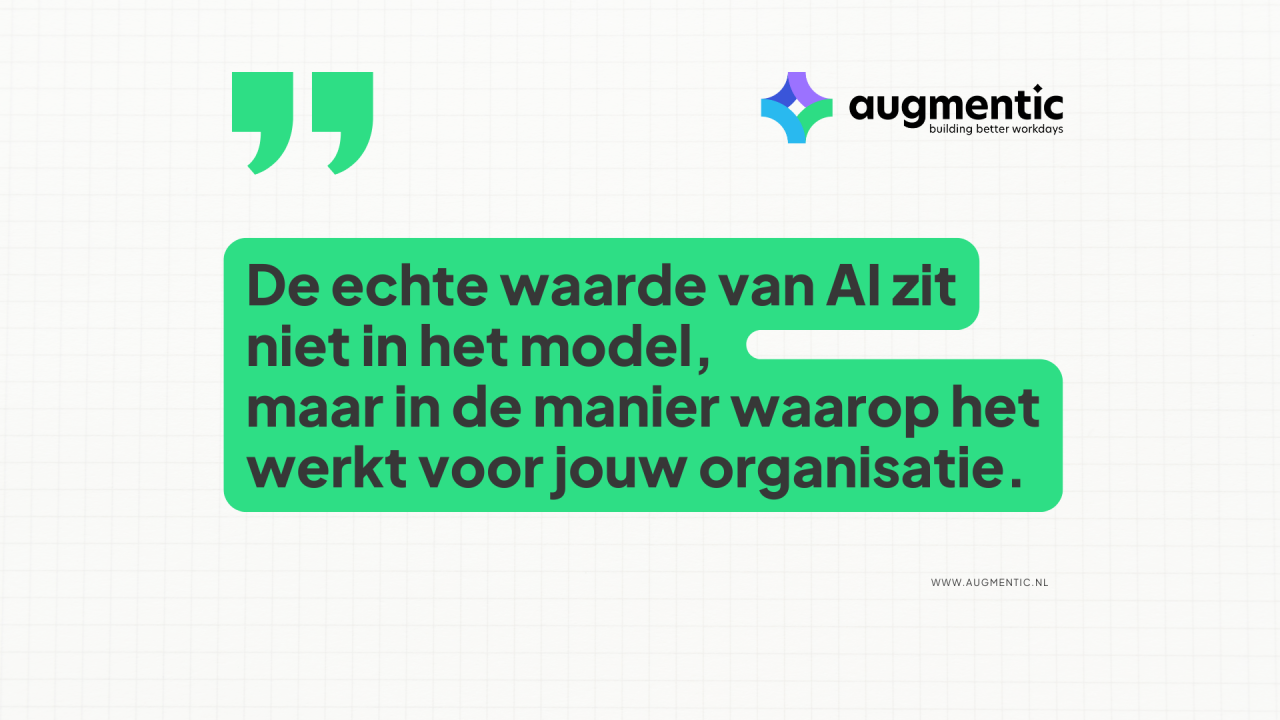Augmentic BV
Haaswijkweg east 12B
3319 GC Dordrecht
The Netherlands
Augmentic BV
Haaswijkweg east 12B
3319 GC Dordrecht
The Netherlands

AI becomes truly valuable only when deployed with specific context and expertise. Generic applications provide limited benefits, while specialized AI agents tailored to specific domains and tasks actually contribute to transformation and quality. Integrating AI as a digital peer within existing processes creates room for more efficient and meaningful work.

The hype around AI is everywhere - from canteen talks to boardrooms. But if you look closely, you will see something striking: many AI projects are not yet delivering much. While the potential is enormous. What goes wrong?
At the AI Engineer Summit 2025 in New York, Douwe Kiela, CEO of Contextual AI and former Head of Research at Hugging Face, gave a presentation that, for us at Augmentic, makes the heart of the problem as well as the solution crystal clear. His message? AI only really works if you apply it with the right context - and if you dare to choose specialization over generic applications.
You see the same pattern in many organizations: a generic AI model is deployed to answer questions or summarize documents. This saves time, but provides little differentiation. Douwe Kiela calls this the bottom layer of the AI pyramid: convenience. It helps you speed up processes, but does not change the core of your organization.
The real value is higher up in that pyramid - where AI contributes to business transformation. Where it not only saves time, but adds quality. You won't get there with a chatbot that explains how many vacation days someone has. That's where you need agents who understand what your organization is really about.
A generic AI assistant knows something about everything. But an expert agent knows everything about something. And that makes all the difference.
Kiela calls this the context paradox: AI excels at logic and analysis, but struggles with something humans take for granted - understanding context. That's exactly where the difference between a nice tool and a valuable digital colleague lies.
Organizations have an enormous amount of domain knowledge - in processes, in data, in documents, in people. By specializing AI by domain, task or role, you can unlock that knowledge much better. Think of agents preparing financial reports, sifting through legal documents or handling complex customer queries with knowledge of policy and history. That's where the real impact of AI will be felt.
At Augmentic, we have translated this principle into our vision and platform approach. In our Agentic platform, Augmentic_OS introduce, each user can have a personal agent who works as a coordinator of a team of specialized agents. Think analytics agents, creative agents or knowledge agents - each with its own task, competence and purpose.
These agents work closely with people, are integrated into existing tools such as email or Teams, and communicate in a natural and recognizable way. Not as black boxes, but as transparent and accountable digital colleagues. Each with measurable performance, traceable output and clear instructions.
Another key insight from Kiela's presentation: pilots are easy. Production is hard. Many AI projects are built for a proof of concept, with ten testers and some sample data. But once the system has to run on hundreds of thousands of documents and thousands of users, the real challenges arise.
That's why at Augmentic, we build with production in mind from day one. We design our solutions so that they are scalable, secure, and robust enough to be used daily. That means early testing with real users, rapid iteration, and not waiting until something is perfect - but until it works.
What Douwe Kiela sharply articulated is at the heart of what we do at Augmentic: AI that works for people. Not as abstract technology, but as a practical help in a complex working day.
Augmentic_OS is our platform in which that vision takes shape. No loose tooling or pilots that linger, but a mature system of agentic AI that is deeply woven into work processes. Agents work in context, deliver immediate value, and are designed to work with people - not replace them.
Agents have job profiles, goals and a place within the digital organization. They provide overview, speed, consistency and control - but always in a way that is understandable and controllable for the people they work with.
At Augmentic, we believe that technology only makes sense when it puts people first. That's why we don't build solutions for the future of work, but for the work of tomorrow - with Augmentic_OS as a platform that already makes that possible today.
Source: Douwe Kiela, "RAG Agents in Production," Leadership Track Session Day, AI Engineer Summit 2025, New York.

InterestingCommentSharingSettings for comments
Add comment...
Open Emoji keyboard
Be the first to comment hereBegin the conversation